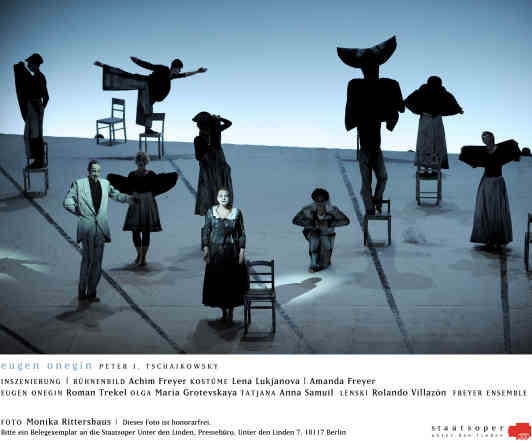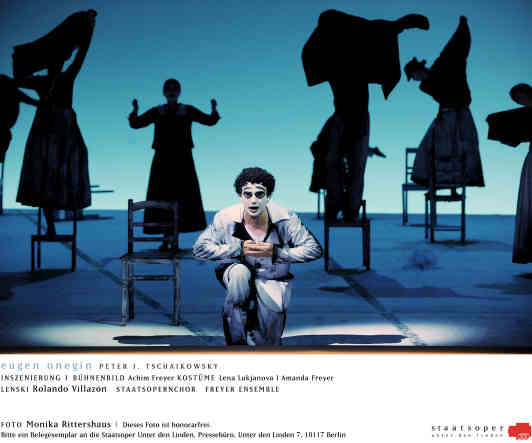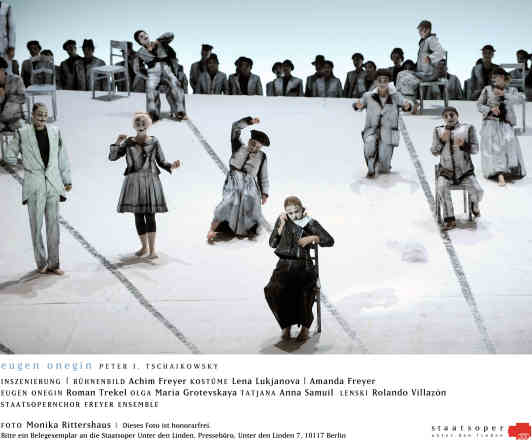Other Links
Editorial Board
- Editor - Bill Kenny
- London Editor-Melanie Eskenazi
- Founder - Len Mullenger
Google Site Search
SEEN
AND HEARD INTERNATIONAL OPERA REVIEW
Tchaikovsky, Eugene Onegin:
Soloists, Staatsopernchor Berlin (chorus master:
Eberhard Friedrich), Staatskapelle Berlin, Daniel
Barenboim (conductor). Staatsoper Unter den Linden,
Berlin, 1.10.2008 (MB)
Anna Samuil of
course contributed to the success of this scene. Hers was not a
portrayal with quite the star quality of some of the great singers
of the past – perhaps this will be come – but it was intensely
musical and often rather more than that. The Letter Scene and her
final confrontation with Onegin were the highpoints of her
performance. I thought less of Maria Gortevskaya’s Olga; there was
nothing especially wrong with her performance but it remained
somewhat anonymous. The production did not help, to put it mildly,
but there were some singers who miraculously managed to rise above
it. Likewise the stiffness that characterised some of Roman Trekel’s
assumption of the title role cannot simply be ascribed to Achim
Freyer, sorely tempted though one might be. The notes were sung –
and sung musically – but there was little charisma here.
Gerald Finley had shown how it should be done at Covent Garden;
by contrast, Trekel, a fine Doktor Faust here in Berlin last year,
seemed miscast. The undoubted star was Rolando Villazón as Lensky.
It is a wonderful role but Villazón surpassed any reasonable
expectations. He proved as ardent and as attentive to the text –
both verbal and musical – as the splendid
Madame Larina – Katharina Kammerloher
Tatyana – Anna Samuil
Olga – Maria Gortsevskaya
Filipievna – Margarita Nekrasova
Eugene Onegin – Roman Trekel
Lensky – Rolando Villazón
Prince Gremin – Stephan Rügamer
Zaretsky – Viktor Rud
Captain – Fernando Javier Radó
Achim Freyer (director and designer)
Tilman Hecker (assistant director)
Lena Lukjanova and Amanda Freyer (costumes)
Olaf Freese (lighting)

Where to begin? The production or the musical
performance? They could hardly have been more
different. I shall start with the musical
performance, since it is far more cheering to do so.
Rarely can Eugene Onegin have been conducted
better than it was here under Daniel Barenboim. He
conceived the work in one span, yet with impeccable
attention to the needs of the moment. There was a
flexibility in his account that harked back to
Furtwängler – although I am not sure that Furtwängler
ever conducted Onegin – with tempo variations
often pronounced yet never abrupt. Prince Gremin’s
aria, for instance, was taken at a daringly slow
tempo but with such masterly control that it worked,
and the mood swings of Tatyana’s Letter Scene
registered both with almost psychoanalytical clarity
and with heartfelt emotion. Rhythmic security was not
sacrificed but enhanced by this. (Instructive is the
contrast with the inhibited stiffness that sometimes
characterised a far from inconsiderable
Covent Garden performance under


What this production lacked in terms of the inept,
it handsomely made up for with the inapt. Throughout we had a scene
of alienated, disengaged circus performers, unable to relate to each
other, indeed in no real sense of the word characters at all. That
was it: no development, no story even, certainly no connection with
the words, let alone with Tchaikovsky’s music. Freyer’s point is
clear enough, that the ‘characters’ are mere stereotypes – which
they are certainly not, should one bother to engage with the work –
and that the love about which they sing is illusory, non-existent.
Everything goes round in circles; no one can do anything about it. I
do not exclude the possibility that such a point might be made in a
production but this was the only point, hammered home with an
insensitive insistency that might make a sledgehammer appear to be a
tool of woolly-minded consensus. The fact is that one could do
precisely the same thing to any work of one’s choice; without even
the slightest attempt to connect Konzept and work, let alone
to permit the former to grow out of the latter, it is difficult to
see how this was a production of Eugene Onegin at all. It was
a relief to have chairs appear suspended in mid-air, simply in order
to see something different. I could not even say that of the sudden
appearance of red ping-pong balls, which merely irritated. Other
than that, there was almost no relief from the monochrome
all-purpose set and the pointless moving around from the Freyer
Ensemble – which seems to appear in all of Freyer’s productions,
whether called for or not – and from the other, incredibly patient
performers. Yes, we got the point a few hours earlier. For some
reason, Lensky appeared to be the focal point, which might well have
been the nub of an interesting production, but this was once again
merely insisted upon rather than developed, let alone explained. Had
he been permitted to become a flesh-and-blood character, then it
might well have worked. The contrast with the musical performance
could not have been greater. Yet, despite Freyer’s relationship to
Brecht, this did not qualify as Brechtian Verfremdungseffekt.
It was not even just a betrayal of the work; it was plain boring.
Mark Berry
Pictures © Monika Rittershaus
Back
to Top
Cumulative Index Page
